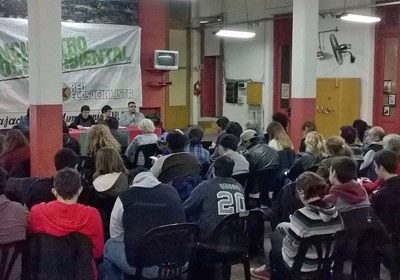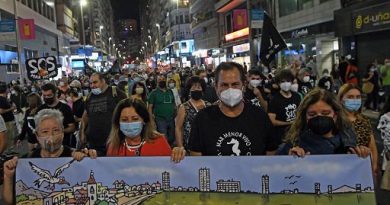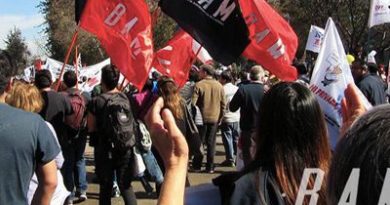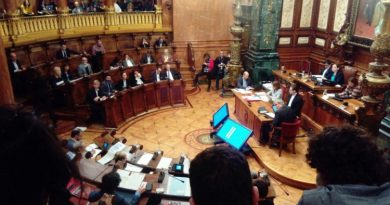Post-liberalism and anti-capitalism
The overall dynamics of the capitalist economy has a particular refraction in Argentina. The macrismo agenda. Progressivism, continuities and ruptures. There is plan B, anti-capitalist and ecosocialist. Our orientation.
Let's change expresses the most right-wing fraction of capitalism. Organically, without mediations, the management cadres of the corporations occupied the springs of the State as if they were branches of their headquarters. The socio-environmental policy of the current government has the economic purpose of intensifying all the dynamics of the extractive model, add production volume to lower the cost per unit of measure. In summary: more soy, more mega-mining and fracking. This strategy has an explanation. To relaunch, overcome the crisis that transits from 2008, capital requires extraordinary appreciation. You have to recover profit rate, cost effectiveness. Marx explained in the Manuscripts of 1857-58 and in the Critique of the Gotha Program that capitalism depletes its two sources of wealth by overexploitation: labor power and nature. The system mounted on the unlimited expansion of exchange values (things to be sold) and overconsumption, maniacally requires, lower production costs of those values. The way to do this is by flattening the price of labor and stockpiling cheap inputs. In summary: make working conditions more flexible and cheaper raw materials. The government of Cambiemos then rushes several laws with high socio-environmental impact:
- Modify the Glacier Law to facilitate mega-mining in prohibited areas
- Ditto with the Forest Law and expanding the soy frontier
- Minimize perimeter areas without spraying
- Pass a new Seed Law
- Close the claim of the native communities to clear the territorial business of fracking and elite tourism.
This roadmap has to overcome the accumulated resistance in the territories. It will not be easy. High potential reserves remain.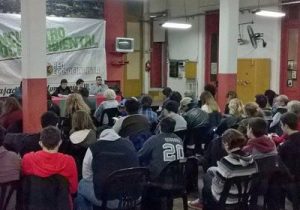
The ecological footprint of progressivism
Missed opportunities have a cost in life, in general. In the class struggle, directly leaves unfortunate balances. The cycle of so-called continental progressivism and its manifestation in our country, has that invoice under his belt. And the opportunity that happened, was not lost as a result of a serious dispute with the corporations. Rather, it is the consequence of an overt political choice: manage extractive capitalism and coexist peacefully with looting corporations. There were relations of strength in favor, positive economic accumulation and international conditions to take measures of emancipatory rupture, anti-imperialist and elemental sovereignty. Isolated measures to encourage consumption and social containment programs, are episodic good news for the most marginalized sectors. But to consolidate basic social rights, structural measures of economic and political change had to be taken. It was not done. And what is worse, this orientation is concealed with the false narrative of "you can't", "People don't give" or variants of that style, which also includes another nonsense: place the responsibility of our own fright on our extraordinary fighting people. To clear up balance controversies and show that a course of independence truncated by the right was not unfolding, but the opposite, we appeal to statistics (inexorable):
- In 2003 there were in the Andean corridor of our country around 40 mega mining projects. In 2015 the FPV withdraws with almost 800
- In millions of hectares of soybeans at the beginning of the 2000 the 7 millions. He 2015 closed with close to 20 millions
- 18 million liters of pesticides in 2003. Almost 400 million in 2015
- Fracking had not. It is incorporated with the YPF-Chevron agreement in 2013.
This table reveals, Finally, that far from any liberating emancipation, a dependent matrix was consolidated, neocolonial and extractivist all along the line. We raise it as a wake-up call with total political honesty to the many sympathizers of the FPV project who with disappointment see the current course of this assembly. We want to build on the political clarification another course with these activists.
Skepticism, bad advisor
The failure of what we call the possibility of adaptation project, has political implications. Let's clarify: Possibility consists in the political position that adapts to the limits (presumed) of capital, of the predisposition of conscience (presumed also) of the people and that therefore, proposes a program of limited social reforms. The frustration with these projects and the political rise of right-wing expressions such as macrismo, feed a disbelieving vision, skeptical, from the perspective. That is the basis of the autonomist approach. This paradigm, that we had to argue with one of its most energetic diffusers (Raúl Zibechi) Recently, denies two issues: 1) the centrality of the working class, and builds the predominance of new subjects (social movements, native peoples, civil society, etc.); Y 2) renounces the political-electoral struggle and (the most negative) to the construction of revolutionary political force. From the Bolivarian failure, this position reasons that the problem lies in electoral participation, not in the program and strategy of those projects that did not play to break with capitalism. It imputes consumerist-extractivist consciousness to the working class, silencing a vector for nothing less: the conscientious structuring role of the union bureaucracy and all capitalist parties. The recommendation then, it would be military to build "spaces of autonomy (coexistence)"With capitalism, its predominant economy and institutions. It would be something like fostering non-capitalist islands in the ocean of the system.. Historical experience indicates that this orientation only contributes to giving capitalism time for its rearmament and new offensive..
Subjects, anti-capitalism and transitions
Our statement is simplified at this point. Our idea is that capitalism as a project is incompatible with full employment, with real democracy, with the self-determination of women, with justice, with freedom of the press and also, obvious, with socio-environmental sustainability. Our strategy hypothesis is stimulated by two ideas of Marx: that the relationship of human society with nature has to be metabolic, rational and dialectical (Capital, book III); and that "the maximum social freedom" consists in the free and democratic planning of production led by workers, no patterns, no corporations. The working class then, continues to be the articulator of a decisive social force block to leverage the post-capitalist transition, post-extractivist. Clear, with labor retraining of workers. Our proposal involves subverting the logic of the current economy and producing values for social use, socially necessary things. Is worth to say: it would be about guaranteeing rights between equals. Food (enough, accessible, healthy) and confront agribusiness, agrarian reform and agro-ecological reconversion included. Also modify the energy matrix and build a serious passage to renewable and clean. Reduction of the working day, distribution of hours with salary equivalent to the cost of living, to guarantee work and social free time. Comprehensive democratization of the political and judicial system, with the dismantling of castes and privileges. Be thoroughly anti-imperialist, and suspend the payment of the debt. Raise secularism as a flag, and separate church from state. War on machismo and its institutional support, patriarchy. Socialize housework, legalize abortion and consummate the entire agenda of the women's movement. Definitely: draw a horizon of structural changes.
For this, it is essential to have an anti-capitalist political force, antipatriarcal, ecosocialist and actively internationalist. El MST, the Ecosocialist Network and the international current that we are part of have this aspiration and fight for it.
Mariano Rosa, national coordinator of the Ecosocialist Network

